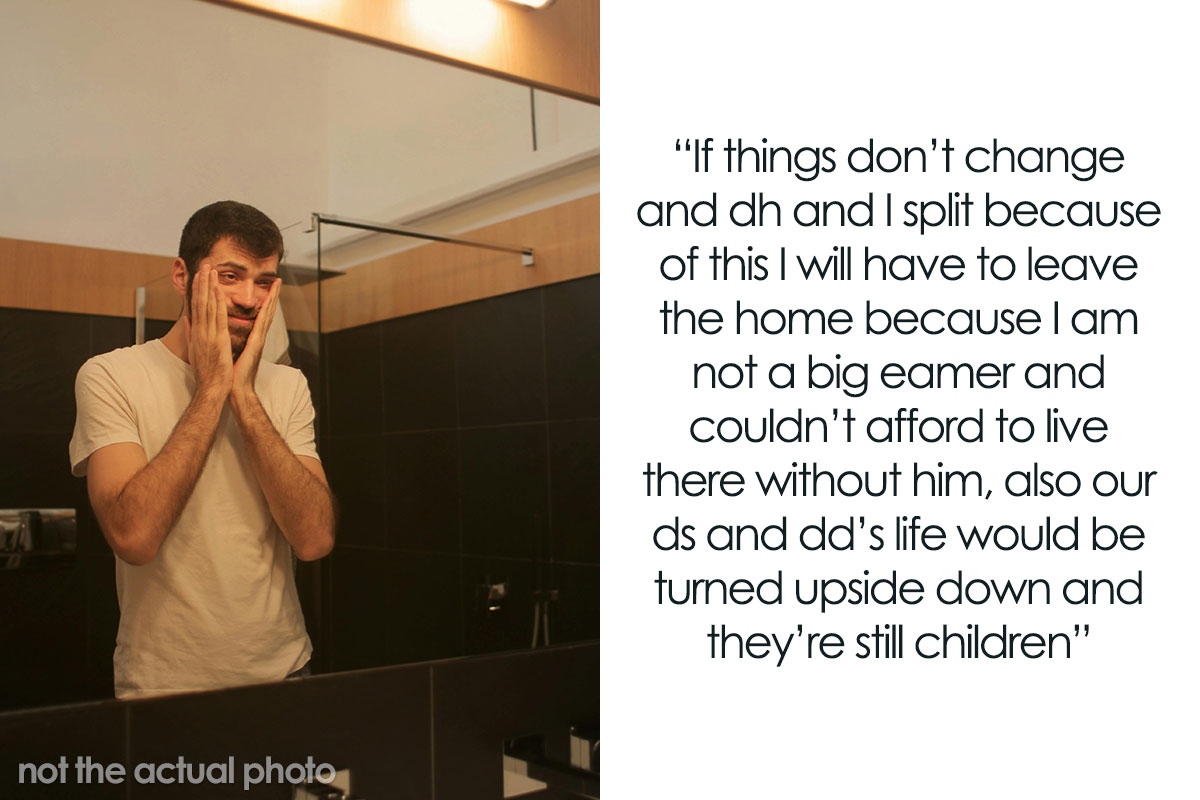
Husband Says Wife’s Adult Son Is Ruining Their Marriage, Wants Him Out Of The House, Wife Is Torn
Interview With ExpertWhen’s the right time to leave home? Straight out of high school? After college? Once you can afford your own place? When your parents say so? It differs for everyone, but one thing is certain: overstaying your welcome can make things difficult for everybody involved.
For one mom on Mumsnet, she found herself stuck between a rock and a hard place when she asked her mid-twenties son to move out and he refused, irking his stepdad. Now there’s friction between the parents, and she’s afraid their marriage might not make it.
More info: Mumsnet
Woman’s son is in his mid-twenties and has a job, but says he’s not ready to move out yet
Image credits: SHVETS production / pexels (not the actual photo)
She says her son’s stepdad is constantly stressed about the living arrangements and wants the son gone
Image credits: Timur Weber / pexels (not the actual photo)
Whenever she brings up moving out, the son gets irritated and walks out
Image credits: Andrea Piacquadio / pexels (not the actual photo)
He refuses to take his ADHD meds, so the stepdad finds him unbearable to be around
Image credits: username1993
She is worried her marriage is in jeopardy, but can’t find a way to keep everyone happy, so she has gone online for advice
OP begins her story by telling the community that her mid-20s son (DS) still lives at home, a fact that is driving a wedge between her and her husband (DH), the son’s stepdad. She says that the stepdad is stressed all the time about the living arrangements and wants the son out of the house.
She adds that when she brings up the subject with her son, he just gets angry with her and walks out. To make matters worse, her son suffers from ADHD and refuses to take his medication, so he’s always acting out, making the situation intolerable for the stepdad.
Apart from when he’s at work, the son is always at home, where he antagonizes his younger siblings and makes rude remarks, since he’s terrible with boundaries. OP says that, ideally, she’d like him to find another place to live because the sense of hostility in the house is reaching a peak, but when she talks to him about it, he tells her he’s not ready.
Now OP fears her entire marriage is at risk because she can’t find any way to keep everyone happy and her husband has had it up to here with the current situation. She adds that if they split, she’ll have to move out, which would be rough on her younger children. OP concludes that she’s exhausted and feels torn between her son and the stepdad.
Image credits: Alex Green / pexels (not the actual photo)
In her article for Daily Trojan, Bella Borgomini writes that, every year in the United States, over 40% of new college students move away from home.
According to a recent Pew Research Center study, young adults in the U.S. are far less likely to live with their parents than those in nearly any European country. American citizens were also more likely to consider living with one’s parents a bad thing.
The cultural difference is obvious in many other parts of the globe as well. In the Middle East and North Africa, it’s widely “customary for young adults to live with their family until marriage.” and, in China, many families opt to live in cross-generational homes.
In her article for MarketWatch, Nicole Lyn Pesce writes that the average American student graduates with $37,000 in debt — and their starting salary will hover around $51,347 on average this year, which is only slightly higher than last year.
Considering those figures, it may not be all that surprising that 50% of young people currently in college (or who plan on going to college) told TD Ameritrade that they plan to move back home until they get their feet under them financially.
Just 38% expect to pay rent while living with their parents; most are returning home expecting to live rent-free so that they can chip away at their loans and start building credit, without housing expenses hanging over their heads.
In a blog for Glossy Belle, author Grace lays out 10 signs that it might be time to consider moving out of your parents’ place. Her top 5 include: still having a curfew, not having enough privacy, having a toxic relationship with one or both of your parents, a commute that’s too long, and hating to give constant updates on your whereabouts.
Knowing when to go can hopefully avoid situations like the upstate New York ‘rents who got a court order to evict their unemployed 30-year-old son after he’d lived there for 8 years and refused to leave. Ideally OP won’t have to go the same route.
Bored Panda reached out to psychologist Dr. Brad Sachs to get his take on the situation. When we asked him whether or not he thought the stepdad was being unreasonable, he said the stepfather’s request is a legitimate one and added that it’s not surprising that the writer’s son does not feel particularly self-assured about moving out, nor is it surprising that the writer continues to feel protective of him and hesitate to ask him to leave. Nevertheless, it sounds like the stepfather “stepped” in effectively many years ago, and it is natural that his patience has worn thin, and that he wants his life, and his marriage, to understandably become priorities at this juncture in his life.
When asked Sachs for one piece of advice he’d offer the family moving forward, he responded by saying that if he had to choose one suggestion, it would be to begin laying the groundwork for the son’s gradual departure. “For example, I can’t tell if the son is paying rent to live there but if he is not, this should certainly be brought up (it sounds like he has a job)—that will make him less comfortable with the current arrangement and perhaps motivate him to decide that if he’s going to be paying rent, he might as well have his own place,” said Sachs.
He added that if the son already is paying rent, then a reasonable timeframe should be established by which time he needs to leave.
“I always tell parents that “deadlines are lifelines”—without a deadline in place, we tend not to fulfill responsibilities that intimidate or worry us. Parents also have to have more faith in their children than their children have in themselves—by making it clear that she/they believe in the son’s capacity to move on, despite how skittish he is, he is more likely to internalize this belief and eventually overcome his fears and worries when it comes to becoming more independent,” Sachs concluded.
What do you think of the mess OP finds herself in? Should she put her son’s needs first, or show him the door and save her marriage? Let us know your opinion in the comments!
Commenters on the mom’s story said her son should be taking his medication, as well as a long, hard look at his future
Poll Question
Thanks! Check out the results:
Off topic, but what the hell is up with the putting dear infront of every title. It sounds insane. "I woke up next to my dear husband, then went to check on my dear daughter and fed my dear cat and drove my dear car to my dear job with my dear boss."
Of course son's not moving out. Everything's free, everyone has to put up with his behaviour, and there are no repercussions. Yay!
If he's not acting like an adult, he shouldn't expect to treated like one. And that includes taking his medication if the RESPONSIBILE ADULTS tell him he needs it.
Load More Replies...Off topic, but what the hell is up with the putting dear infront of every title. It sounds insane. "I woke up next to my dear husband, then went to check on my dear daughter and fed my dear cat and drove my dear car to my dear job with my dear boss."
Of course son's not moving out. Everything's free, everyone has to put up with his behaviour, and there are no repercussions. Yay!
If he's not acting like an adult, he shouldn't expect to treated like one. And that includes taking his medication if the RESPONSIBILE ADULTS tell him he needs it.
Load More Replies...
 Dark Mode
Dark Mode 

 No fees, cancel anytime
No fees, cancel anytime 




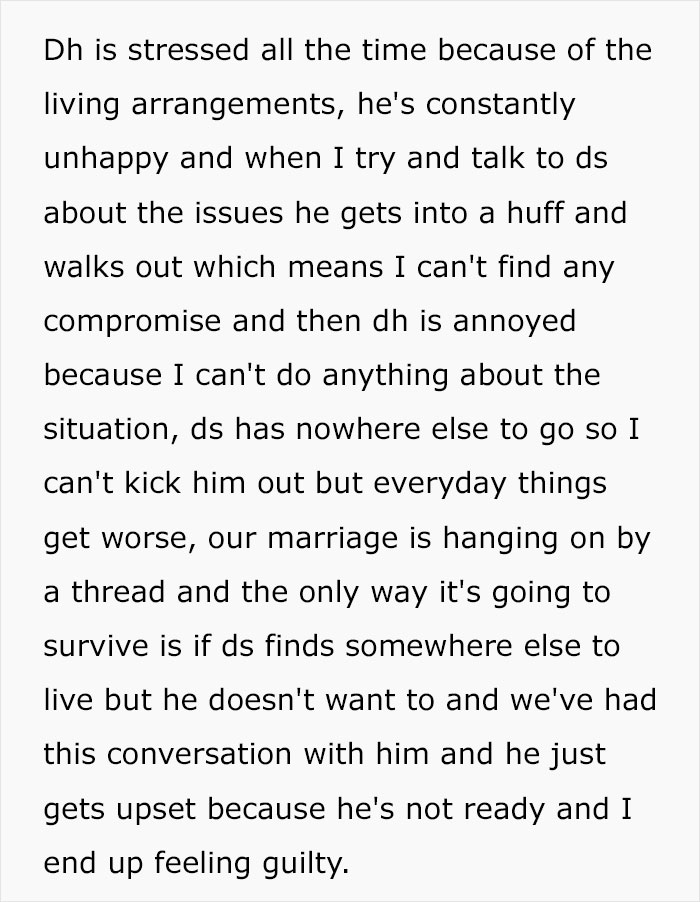


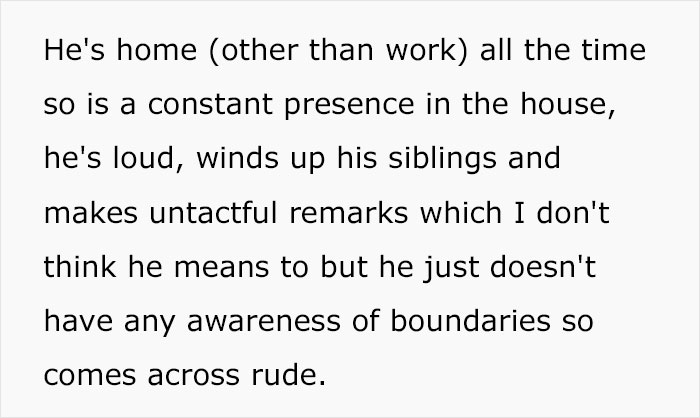

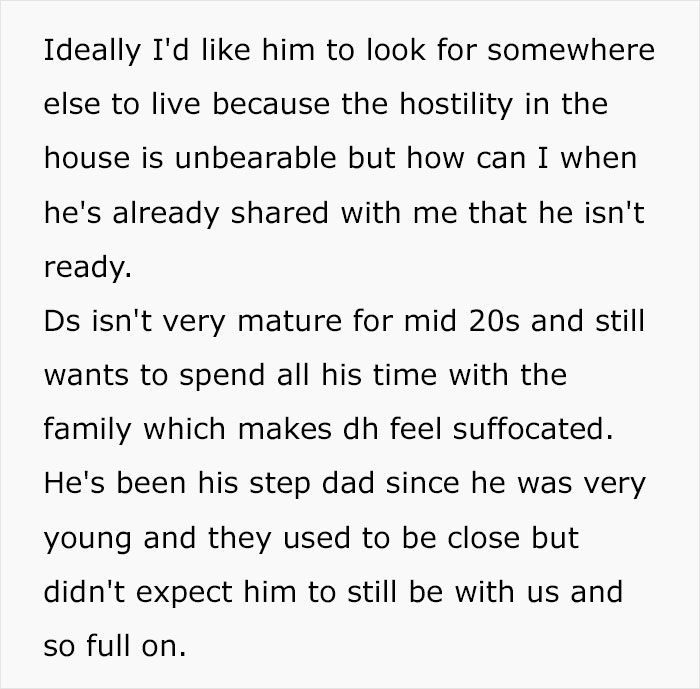
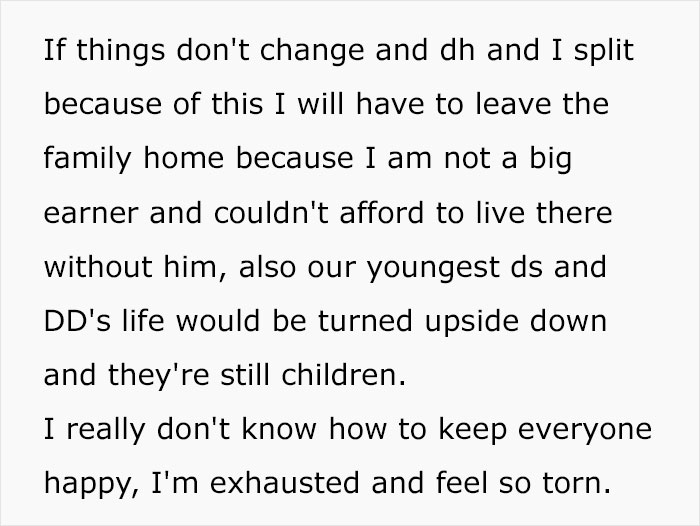







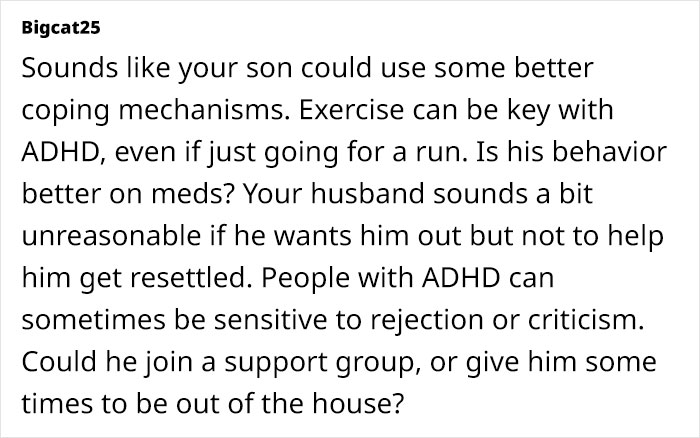

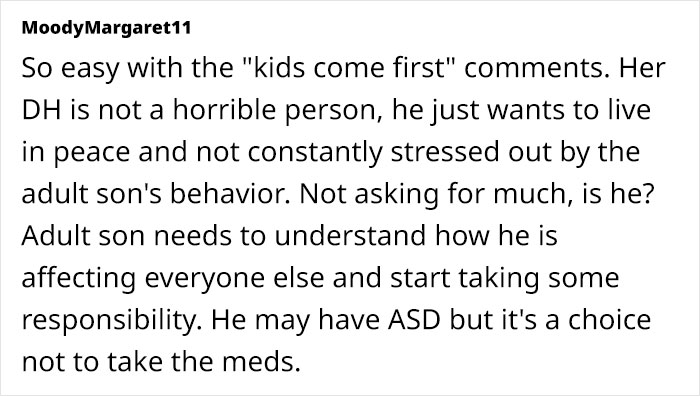

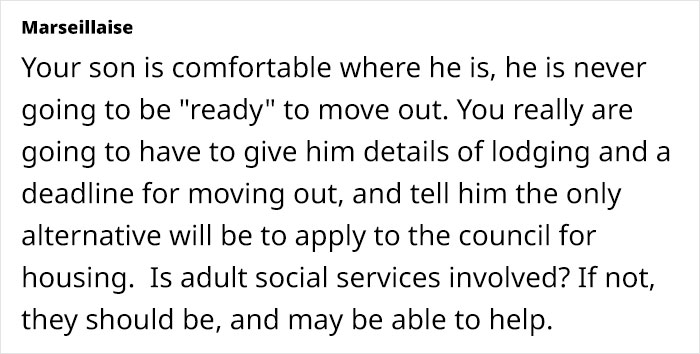

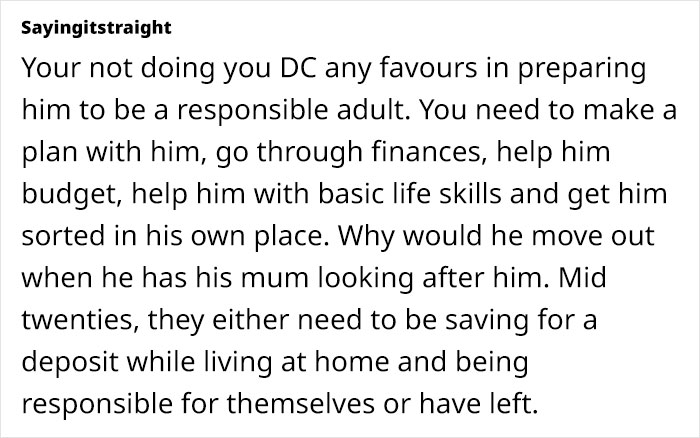





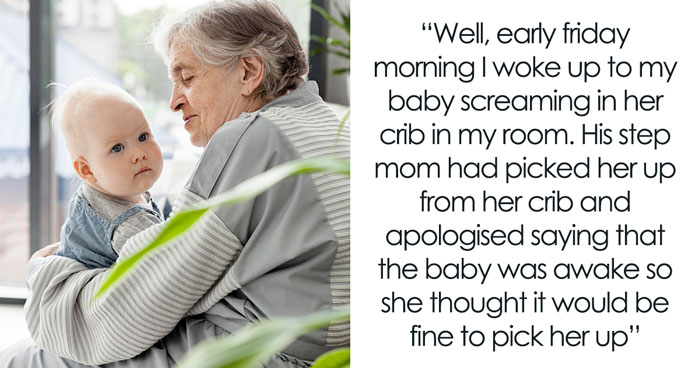



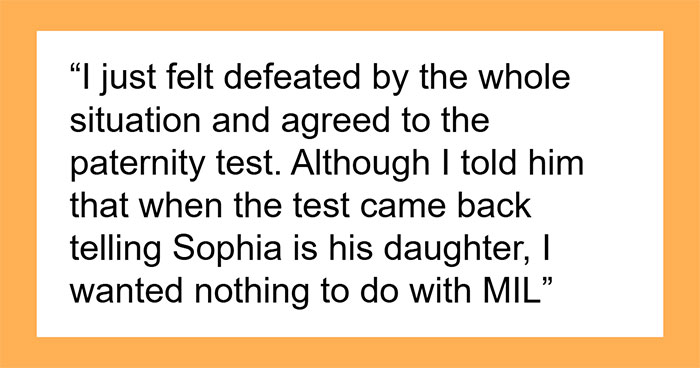















43
65